|
|
|
Sort Order |
|
|
|
Items / Page
|
|
|
|
|
|
|
| Srl | Item |
| 1 |
ID:
191071


|
|
|
|
|
| Summary/Abstract |
Advertisements for commodities offer a unique keyhole into the shifting consumption practices and media constructions of the youthful consumer. An analysis of five student and youth magazines foregrounds the gendered and materialistic idealisations of leisure invoked to promote branded goods in the Indian youth market. Analysing advertisements in these magazines allows us to trace the increasingly sophisticated way in which capitalist actors stratified the domain of advertising by life stages during the late colonial and early post-colonial periods in India. This finding runs contrary to the grain of historiography that contends that the Indian ‘market’ failed to respond to the interests of consumers prior to the media liberalisation of the 1980s and 1990s.
|
|
|
|
|
|
|
|
|
|
|
|
|
|
|
|
| 2 |
ID:
191065
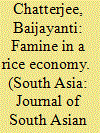

|
|
|
|
|
| Summary/Abstract |
This paper analyses the conjuncture of factors that led to famines in late eighteenth century Bengal, a province in which, due to the fluvial ecology and monsoonal climate, the cultivation of rice predominated. I demonstrate that the exclusive dependence on rice crops created conditions of agricultural insecurity, which in turn was taken advantage of by merchants and hoarders of grain in a bid to profit from artificially enhanced prices. The East India Company, acquiring political authority in Bengal in the mid eighteenth century, was unable to break through the monopolies of the grain dealers. In addition, its experiment with grain storage in large public granaries (golas), intended to overcome food shortages, also failed on account of mounting costs and the irrevocable tension between laissez-faire and state interventionism, which ultimately led to the abandonment of the granary system. I argue that a combination of rice monoculture, mercantile strategies, and lack of effective state intervention was ultimately responsible for transforming natural calamities and the ensuing food shortages into full-scale famines in Bengal in the eighteenth century.
|
|
|
|
|
|
|
|
|
|
|
|
|
|
|
|
| 3 |
ID:
191061
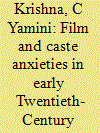

|
|
|
|
|
| Summary/Abstract |
Film was one of the new technological inventions of the ‘long nineteenth century’ that often instilled a fear of loss of the existing way of life and of disturbing existing social structures. In India, this manifested in a variety of ways, such as through the censorship of films by the government, but also by social codes which created major barriers for many to work in the film industry. In this article, I discuss film and its negotiations with caste in the twentieth century through close reading of the Indian Cinematograph Committee Report, film magazines, advertisements, audience responses and the speeches of nationalist leaders. I argue that rather than democratising desire by producing the universally desirable object of the star body, popular films in India produced desire that conformed to existing caste structures. The paper contributes to debates about early cinema and caste beyond the question of representation.
|
|
|
|
|
|
|
|
|
|
|
|
|
|
|
|
| 4 |
ID:
191064
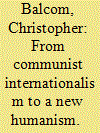

|
|
|
|
|
| Summary/Abstract |
This paper investigates the thought of the Indian revolutionary and philosopher M.N. Roy (1887–1954). The essay argues that Roy’s pivot from Marxism to a liberal ‘New Humanism’ over the course of the 1930s and 1940s was shaped by his thinking about fascism and represents a broader turn away from a materialist reading of history and loss of confidence in the Indian working class. The paper begins with an analysis of Roy’s early communism, and considers his later critique, elaborated from the 1930s onwards, that ‘Gandhism’ represented an Indian form of fascism, and explores how these arguments led to his rejection of Marxism.
|
|
|
|
|
|
|
|
|
|
|
|
|
|
|
|
| 5 |
ID:
191069
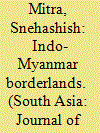

|
|
|
|
|
| Summary/Abstract |
Since the 1990s, the Government of India has undertaken several policy initiatives to facilitate cross-border flows. Such initiatives can be read as an effort to transform ‘battlefields into marketplaces’. This paper examines the rise of the border town of Champhai, located on the India-Myanmar border in the state of Mizoram in Northeast India. The formation of a new urban centre in a frontier region based on border trade reveals different dimensions of transition in Northeast India’s borderlands. The paper explores two key themes: how border trade, comprised of legal and illegal flows, has transformed Champhai into Mizoram’s third-largest city, and how increasing trade across the border reorients the interethnic dynamics with strong implications for ethnic and citizenship politics in Mizoram. The paper concludes by highlighting the different aspects discussed in the article that would determine the borderland dynamics in Mizoram.
|
|
|
|
|
|
|
|
|
|
|
|
|
|
|
|
| 6 |
ID:
191062


|
|
|
|
|
| Summary/Abstract |
This essay investigates new articulations of belonging and community identity that emerged in Odisha, on the eastern coast of India, in the late nineteenth and early twentieth century through the works of an inspector of schools. Largely taken in the historiography to be mere bureaucrats, inspectors of schools, especially in colonial Odisha, were an important component in the administration of the province, and emerged as arbiters of taste, doyens of Odia literature, and public intellectuals. This essay proposes that their negotiation with the colonial apparatus and prevalent Odia linguistic nationalist spirit was carried out through a novel cultural ideology, ‘critical conservatism’. Deploying a comparative framework with the development of conservatism in Bengal, this essay examines the uniqueness of the conservative impulse in Odisha, thereby suggesting a rethinking of conservatism as a cultural enterprise. Moving away from the focus on the literary works of Fakir Mohan Senapati, this article throws light on the works and lives of other figures of modernity such as Radhanath Ray, Nanda Kishore Bala, Madhusudan Rao, and the Satyabadi School, a unique intervention in pedagogy taken up in Odisha in the early twentieth century.
|
|
|
|
|
|
|
|
|
|
|
|
|
|
|
|
| 7 |
ID:
191067
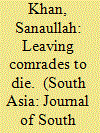

|
|
|
|
|
| Summary/Abstract |
The Siachen glacier, one of the longest non-polar glaciers in the world, turned into the world’s highest battlefield in 1984, when both the neighbouring countries, India and Pakistan, deployed their troops for control over the glacier. The nature of warfare since then has changed from active operations to one of low-intensity warfare. In this changing nature of warfare, the article explores how meanings of death are reconfigured in personal recollections and public representations, when the terrain continues to inflict injuries, high-altitude illnesses and death in the absence of any direct enemy confrontation. The article compares personal experiences of death with media representations. While personal experiences of soldiers and officers who have served on the glacier show their grievances about having left comrades to die after they fell into deadly crevasses, media representations reinsert the Indian soldier and depict death in the company of comrades and family to justify the expensive and extremely difficult war over the glacier.
|
|
|
|
|
|
|
|
|
|
|
|
|
|
|
|
| 8 |
ID:
191068
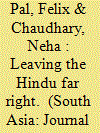

|
|
|
|
|
| Summary/Abstract |
Why do people leave the world’s largest far-right organisation? In this article, we analyse six autobiographical defection accounts of ex-members of the Rashtriya Swayamsevak Sangh (RSS), the apex organisation of the Indian Hindu nationalist movement. Compiled here for the first time, an analysis of these accounts reveals that even the most disciplined and ideologically coherent far-right organisations suffer from internal organisational messiness and attrition. These accounts challenge the unique mythology that surrounds the RSS and gesture towards the methodological possibilities of discarding the ideology-driven analyses of the far right in favour of material analyses of the lives of far-right organisational members.
|
|
|
|
|
|
|
|
|
|
|
|
|
|
|
|
| 9 |
ID:
191070
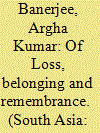

|
|
|
|
|
| Summary/Abstract |
This article undertakes a critical exploration of the Indian poetic responses to World War I. The most striking feature of this poetry was its uniquely diverse nature, which reflected in full the multicultural character of the Indian army at the Western Front and elsewhere in the world. The immense diversity of Indian soldiers triggered a wide range of emotions and ideas from combatants and civilians alike. While we have established writers like Rabindranath Tagore and Sarojini Naidu on the one hand, we have a poetic miscellany of lesser known creative voices on the other, some even documenting their first-hand experiences of the War. Poems, lyrical propaganda, folk-songs, epistolary verse, elegies and even verses accompanying posters make up the various modes of literary circulation during this time of unprecedented global turmoil. Making use of both original compositions and various other works in translation, this article argues that most of this poetic evidence often serves as crucial testimonies, chronicling not only the major historical events of the War years, but also assiduously recording the wide gamut of feelings and emotions associated with the conflict.
|
|
|
|
|
|
|
|
|
|
|
|
|
|
|
|
| 10 |
ID:
191059


|
|
|
|
|
| Summary/Abstract |
Prior research on Latin American and European populism has used the inclusionary and exclusionary distinction to differentiate between Left- and Right-wing populism. As Right-wing populists demand exclusion of immigrants and foreigners and Left-wing populists demand inclusion of the lower social class in the political landscape, the former is described as exclusionary and the latter as inclusionary. In this paper, I test this typology, comparing the populism of two political leaders in Pakistan across two different eras: Zulfiqar Ali Bhutto during 1967–77 and Imran Khan during 1996–2022. I argue that in the absence of an overarching liberal discourse, the inclusionary-exclusionary distinction has no meaning because populists of illiberal democracies can rely upon a greater ideological malleability, swinging between inclusionary to exclusionary politics in accordance with the demands of the moment.
|
|
|
|
|
|
|
|
|
|
|
|
|
|
|
|
| 11 |
ID:
191060


|
|
|
|
|
| Summary/Abstract |
Culture-specific knowledge plays an important role in shaping environmental conservation. Yet we lack a holistic and contemporary understanding of how such local cultural systems interface(d) with ecologies, especially in the fast-growing cities of the Global South which face profound environmental challenges. In this paper, we explore nature-based cultural systems embedded in folk-songs to understand situated social-ecological histories of human-inhabited peri-urban landscapes in the city of Bengaluru in South India. Drawing on empirical observations from the city, we trace local imageries of erstwhile lake-based social systems through folk-songs, mythologies and oral narratives. We demonstrate how many of these cultural narratives, largely embedded within symbolic linkages to the lake ecology, continue to manifest themselves as folk expressions in the city, despite the fact that most of the lakes have been polluted or are managed via restrictions that prohibit village residents from accessing them as they once did for agriculture, livelihoods and domestic use. The songs are also rich reminders of socialities, which, despite being divisive and hierarchical to a large extent, were symbolically and materially embedded in nature.
|
|
|
|
|
|
|
|
|
|
|
|
|
|
|
|
| 12 |
ID:
191063
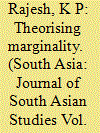

|
|
|
|
|
| Summary/Abstract |
Despite the accepted usage of ‘marginality’ as a subcategory of subalternity, seldom has the meaning of marginality as a concept been expounded. This paper sets out to address this lack by conceiving of ‘marginality’ as a condition, by focusing on the lived experiences of Adivasis in Kerala through the discourses constructed by a contemporary social movement, the Adivasi Gothra Maha Sabha (AGMS). Discourse analysis is the methodological frame that I have used in this paper to analyse the descriptions produced by the AGMS and the state of Kerala, and this is broadly situated within the post-colonial political-sociological approach. Premised on this, I argue that while marginality is an essential concept for looking at contemporary Adivasi movements in India, it is productive to interrogate and explore expanding the varied meanings attached to this concept.
|
|
|
|
|
|
|
|
|
|
|
|
|
|
|
|
| 13 |
ID:
191066


|
|
|
|
|
| Summary/Abstract |
The paper describes caste contestations around the Bhutaradhane tradition in the Tulunadu region of coastal Karnataka. Bhutaradhane is a pantheistic tradition of spirit worship which has been a key site for the assertion of regional identity claims in Tulunadu. The Bhutas (spirits) are ranked along a graded hierarchy that reflects the caste structure of the region. Drawing on ethnographic fieldwork, the paper describes the interventions of a Dalit caste, the Mundalas, to rupture this hierarchical structure and challenge their low assigned status in the tradition and in society. It explores how they draw on narratives of the past to appropriate and reshape the Bhutaradhane tradition in line with their aspirations for upward mobility. The paper situates current contestations around the caste’s patron Bhuta within the growing socio-political consciousness of the Mundalas, who have challenged the hegemonic discourse of Bhuta heritage, laying bare the operations of caste within the ritual as well as caste inequalities and exclusions in the region.
|
|
|
|
|
|
|
|
|
|
|
|
|
|
|
|
|
|
|
|
|